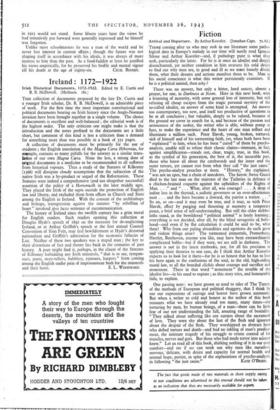Fiction
Arrival and Departure. By Arthur Koestler. (Jonathan Cape. 7s. 6d.) THOSE coming after us who may seek in our literature some patho- logical data in Europe's malady in our time will surely read Ignacio Silone and Arthur Koestler—and, if pathology pure is what they seek, particularly the latter. For he is at once an idealist and deeply disenchanted, yet neither condition in him oversets his cold desire to find out why men are, in good and ill as we mast loosely divide them, what their dreams and actions manifest them to be. Man in his social conscience is what this writer persistently examines. If he is a political animal, then why ?
There was no answer, but only a bitter, hard outcry, almost a prayer, for one, in Darkness at Noon. Here in this new book, with a lessening of austerity, with some general loss of intensity, but still refusing all cheap escapes from the tragic personal mystery of the so-called idealist, an answer of some kind is attempted. An answer too contemporary, too new, and itself too productive of questions to be at all conclusive ; but valuable, deeply to be valued, because of the ground we cover in search for it, and because of the passion and seriousness of the seeker, the writer who is able, without pomp or fuss, to make the experience and the heart of one man reflect and illuminate a million such. Peter Slavek, young, broken, tortured, sick of himself and of his tormenting faith, yet, when both have been " explained " to him, when he has been " cured " of them by psycho- analysis, unable still to refuse their classic claims—immune, in fact, against simplification—stands out, dear, tragic, true, in this book, as the symbol of his generation, the best of it, the incurable part, those who know all about the catchwords and the inner and the outer terrors, yet cannot rest. from what they call " the just cause." The psycho-analyst preaches at them. " History," she explained, " was not an epos, but a chain of anecdotes. The heroic Swiss Guard died to the last man on the staircase of the Tuileries in defence of a chicken-brained coquette against the upholders of the Rights of Man. . . ." and " . . . What, after all, was courage? . . . A drop of iodine less in the thyroid, a ,sadistic governess or an over-affectionate aunt . . and the hero became .a coward, the patriot a traitor. . . ." So on, so on—and it may even be true, and it may, as wjth Peter Slavek, effect by purging and thrusting at memory a temporary peace, a brief sense of self-understanding. But still the older shibbo- leths stand, as the bewildered " political animal " is lately learning ; everything is not decided, after all, by the blind savageries of...baby- hood—and even if by flat calculation it could be said to be, what then?. Why from our puling absurdities and egotisms do such great and violent things arise? The tormented immortals, Prometheus, Hamlet, Beethoven, anyone you like, may have been extraordinarily complicated babes—but if they were, we are still in darkness. The answer is not in the latest textbooks, nor, for all his precision in applying their theories to one case, do I think that Arthur Koestler expects us to look for it there—for he is so honest that he has to lose his hero again to the confusions of the soul, to the old, high-riding moral law, to all the bearded clichés about courage and sacrifice and atonement. There in that word " atonement " the trouble of the idealist lies—in his need to expiate ; as this story tries, and honourably fails, to explain.
One pasting note : we have grown so used to tales of The Terror, of the methods of European and political thuggery, that I think by use our expressions of outrage and 'horror have grown automatic. But when a writer so cold and honest as the author of this book recounts what we have already read too many, many times—the torturing by men, by human beings,, of a man—there can be little fear of our not understanding the full, amazing range of bestiality. " They talked about suffering like coy curates about the sacrament of love. They were shy about the lust of the flesh and ignorant about the despair of the flesh. They worshipped an abstract hero who defied torture and death—and had no inkling of man's predica- ment, the intimate tragedy of his struggle to retain control of his muscles, nerves and guts. But those who had made terror into science knew." Let us read all of this book, shirking nothing of it in our cosy comfort—and see if we can work out why men like ourselves, nervous,' delicate, with desire and capacity for normal health and normal hope, persist, in spite of the explanations of psycho-analysis, The fact that goods made of raw materials in short supply owing to war conditions are advertised in this journal should not be taken as an indication that they are necessarily available for export.


























 Previous page
Previous page